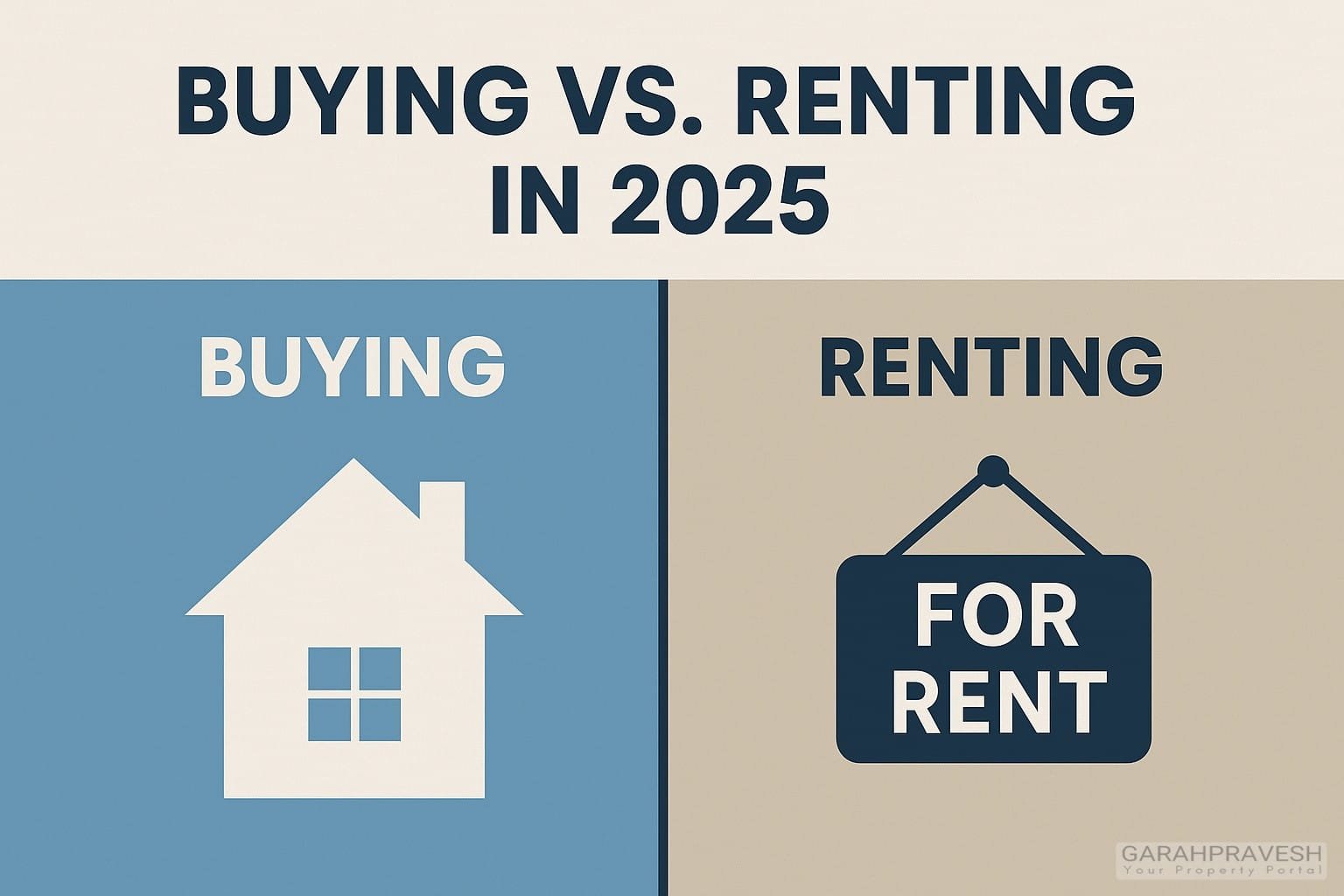Introduction to the Housing Market in 2025
The housing market in 2025 is shaped by a complex interplay of economic factors, including fluctuations in home prices, interest rates, and rental prices. As we navigate through this year, it is crucial to understand the trends that define the current landscape of homeownership and renting, as they profoundly impact financial decision-making for potential buyers and renters alike.
Home prices have exhibited a significant upward trajectory in recent years, driven by growing demand and a constrained supply of available properties. This trend is evident in urban and suburban areas alike, where many individuals and families are eager to secure a home amidst a competitive market. In 2025, average home prices are projected to remain elevated, influenced by factors such as sustained population growth and increasing construction costs. These conditions contribute to the ongoing challenge many first-time homebuyers face in entering the market.
Interest rates also play a pivotal role in shaping the housing market dynamics. As of 2025, interest rates are experiencing fluctuations, which directly affect mortgage affordability. Higher interest rates can lead to increased borrowing costs, making it more challenging for buyers to finance their homes. Conversely, low interest rates can stimulate purchasing activity, providing an incentive for potential buyers to enter the market. This economic variable is paramount when evaluating the feasibility of homebuying versus renting.
On the rental front, rental prices have similarly surged in recent years, reflecting increased demand from those unable to purchase a home. The growing prevalence of remote work has also contributed to a shift in rental preferences, with individuals seeking amenities and locations that facilitate their work-life balance. Consequently, rental prices in urban areas have risen disproportionately compared to suburban markets. Understanding these trends is essential for making informed housing decisions moving forward.
Understanding the Financial Aspects of Buying a Home
In the contemporary housing market, evaluating the financial implications of buying a home in 2025 is crucial for potential homeowners. One of the primary considerations is the down payment, typically ranging from 3% to 20% of the home’s purchase price. A higher down payment can significantly lower monthly mortgage payments and reduce the overall interest paid over the loan’s duration. A thorough assessment of available savings and financial capability is therefore essential to effectively navigate this initial hurdle.
The next significant financial aspect is the mortgage itself. Securing a mortgage in a fluctuating market can be challenging, as interest rates play a pivotal role in determining monthly payments. In 2025, it is anticipated that rates may vary; hence, prospective buyers should shop around for the best mortgage products available. Fixed-rate mortgages provide stability and predictability, while adjustable-rate options might initially offer lower payments but pose risks of future increases. Understanding the terms and conditions of the mortgage can aid in making an informed decision that aligns with long-term financial goals.
Additionally, property taxes are an ongoing expense that often comes with homeownership. These taxes can vary widely based on local regulations and property values, impacting monthly budgets. It is crucial to factor in these costs when determining affordability, as they can significantly affect overall financial health.
Lastly, buying a home is often viewed as a long-term investment, with home appreciation rates playing a crucial role in calculating potential return on investment. In markets that show upward trends in property values, homeowners may benefit from increased equity over time. However, the commitment to homeownership must be balanced against potential risks, including market fluctuations and maintenance costs, to ensure that this investment is financially sound for the future.
Exploring the Costs and Benefits of Renting
As individuals consider their housing options in 2025, renting emerges as a viable alternative to purchasing a property while presenting distinct costs and benefits. One of the most significant financial considerations when renting is the monthly rent, which can vary widely based on location, property type, and market demand. In urban areas, for instance, monthly rental costs may steadily increase, compelling prospective renters to evaluate their budgets carefully. Additionally, it is essential to factor in the required security deposit, typically equivalent to one month’s rent, which serves to protect the landlord against potential damages or unpaid rent. This upfront cost can be a deterrent for some, but it is generally less burdensome than a down payment on a home.
Moreover, renters often need to invest in renters’ insurance, which safeguards personal belongings. This relatively low-cost insurance can provide peace of mind, ensuring that valuables are protected against theft or damage. Unlike homeowners insurance, renters’ insurance tends to be more affordable, thereby reinforcing rental as an attractive option for those mindful of expenses.
The flexibility offered by renting is another critical benefit to consider. Renting allows individuals to relocate with ease, whether for job opportunities or lifestyle changes, without the long-term commitment associated with homeownership. If the local job market shifts or personal circumstances evolve, renters can often adapt quickly. Furthermore, the maintenance and repair responsibilities fall to landlords, alleviating the burdens typically faced by homeowners, such as property upkeep and emergency repairs. This lower financial commitment and reduced responsibility can make renting an ideal choice for those prioritizing mobility and convenience in an ever-changing housing landscape.
Market Predictions: Interest Rates and Economic Indicators
As we look ahead to 2025, it is crucial to assess the economic landscape and interest rate predictions to understand their implications for both homebuyers and renters. A variety of economic indicators can provide insight into the potential trends we might witness in the housing market. For instance, forecasts indicate that interest rates may experience fluctuations influenced by central bank policies aimed at combating inflation and stimulating economic growth. An increase in interest rates can lead to higher mortgage rates, which tend to decrease the purchasing power of prospective homebuyers, potentially making renting a more attractive option.
Additionally, factors such as employment rates, GDP growth, and consumer confidence play vital roles in shaping the real estate market. A robust job market and steady economic growth are likely to enhance consumer confidence, encouraging more individuals to pursue homeownership. On the other hand, if economic indicators point toward a potential recession or stagnation, this could dampen buyer enthusiasm, rendering home purchases less favorable. The interplay between these economic conditions and interest rates is paramount in guiding consumer decisions regarding home purchases versus renting.
Furthermore, demographic trends, such as millennial buying habits and urban migration patterns, are essential to consider. As younger generations enter the housing market, their preferences may shift towards renting, particularly in urban areas where housing affordability remains a challenge. This shift could add pressure on rental markets, driving rental prices higher, which could in turn impact long-term financial planning for potential renters.
In summary, keeping a close eye on interest rate predictions and key economic indicators in 2025 will be vital for individuals contemplating whether to buy or rent their living spaces. Understanding how these factors interact can significantly aid in making informed financial decisions in a dynamic economic environment.
Case Studies: Real-life Scenarios of Buyers and Renters
In 2025, a detailed examination of individual case studies reveals the complex decision-making processes involved in choosing between buying and renting homes. Consider the scenario of the Smith family, who opted for homeownership. With a stable income, they purchased a three-bedroom house in a suburban area. Their decision was largely driven by the desire for long-term investment and the stability that ownership provides. Over the years, the Smiths witnessed a gradual appreciation of their property’s value, which proved financially beneficial. However, they faced challenges such as unexpected maintenance costs and the burden of property taxes, which often constrained their monthly budget.
On the opposite end of the spectrum, the Johnsons chose to rent a two-bedroom apartment in the same neighborhood. They valued flexibility, as their jobs in tech allowed for potential relocation opportunities. Renting provided them with a lower monthly expense compared to the Smiths’ mortgage payments, enabling them to allocate funds toward savings and travel. Despite experiencing a rent increase in 2025, which affected their budget, the Johnsons appreciated their lack of responsibility for maintenance, which is often required by homeowners. This case highlights the advantages of renting, particularly for those prioritizing mobility and less financial obligation.
Furthermore, the Parkers’ situation illustrates a middle-ground approach. They initially rented but later bought a condo within the same city. Their transition was a result of careful financial planning and the desire for equity-building. While the initial years of renting allowed them to save for a down payment, they eventually had to navigate the financial implications of homeownership, including decision-making regarding home equity. Each case illustrates that choosing to buy or rent in 2025 involves diverse personal circumstances and financial outcomes, demonstrating that one option may be better suited for different individuals or families based on their unique needs and preferences.
Long-term vs. Short-term Financial Perspectives
When evaluating the financial implications of buying versus renting a home in 2025, it is imperative to consider both long-term and short-term perspectives. These perspectives can significantly influence an individual’s decision, tailored best to their specific circumstances and future aspirations. The transient nature of one’s lifestyle, such as location stability due to job assignments or personal commitments, plays a crucial role in this analysis.
Renting often appeals to those who expect to relocate within a few years or whose job situation is less stable. In such cases, the flexibility that renting offers can outweigh the potential advantages of homeownership. Renters can easily relocate without the additional burden of selling a property, thus avoiding the associated costs, such as agent fees or market depreciation. This short-term approach allows individuals greater adaptability to changes in their careers or personal lives.
Conversely, buying a home is generally seen as a long-term investment. For individuals who anticipate remaining in a particular location for a significant period, purchasing real estate may provide financial benefits that outweigh the initial costs involved. Homeowners build equity over time and can benefit from property appreciation. In many housing markets, real estate has proven to be a stable asset that can serve as a hedge against inflation, making it an appealing choice for those with a firm commitment to their community.
Another crucial aspect to consider is personal financial goals. Individuals must evaluate their readiness for the responsibilities of homeownership, including maintenance costs and property taxes. Aligning these goals with the decision to buy or rent not only informs the immediate financial implications but also impacts long-term wealth-building strategies. Thus, one must weigh the pros and cons of both renting and buying, taking into account current and future plans as they pertain to both lifestyle and financial stability.
Tax Implications and Incentives for Homeowners vs. Renters
The decision between buying and renting a home often hinges on a variety of financial considerations, specifically the tax implications associated with each option. Homeownership has traditionally provided several beneficial tax incentives, which can significantly lessen the overall cost of owning property. Among the most notable tax benefits is the deduction for mortgage interest payments. Homeowners can deduct the interest paid on their mortgage for up to $750,000 in loan debt, which can result in substantial savings, especially in the early years of a mortgage when interest payments are typically higher.
Additionally, homeowners can also deduct property taxes from their federal income tax returns, further reducing their taxable income. This dual advantage of deducting both mortgage interest and property taxes can make homeownership financially attractive for many individuals and families, particularly those in higher tax brackets. Furthermore, when the home is sold, homeowners may be able to exclude up to $250,000 in capital gains from their tax obligations, or $500,000 for married couples, should the property have been their primary residence for at least two of the past five years.
<pon 2025.
Impact of Lifestyle and Personal Preferences on Decision Making
The decision to buy or rent a property is influenced significantly by individual lifestyle choices and personal preferences. Each person’s situation is unique, and factors such as flexibility, community involvement, and future aspirations play a crucial role in this financial decision. For some, the flexibility offered by renting is paramount. Renters typically enjoy the ability to relocate without the constraints of a mortgage, making it easier to adapt to changes in employment or personal circumstances. This adaptability can be especially appealing to younger individuals or those in transient stages of life, where commitment to a single location may not be ideal.
Moreover, community involvement can heavily sway the buying versus renting decision. Individuals who prioritize building a sense of belonging may find that purchasing a home allows them to establish roots within a community, contributing to local events and social networks. Homeownership often evokes a sense of stability, which can enhance one’s connection to their neighborhood. In contrast, those who value diverse experiences and the ability to explore different environments might prefer renting, as it affords the chance to live in various neighborhoods or cities without the long-term commitment associated with buying.
Future goals also play a vital role in determining whether buying or renting is the better option. Prospective homeowners might view property ownership as a pathway to wealth accumulation or investment, believing that real estate can appreciate over time. However, individuals more focused on short-term goals or personal development may opt for the financial liquidity and lower obligations provided by renting. This decision-making process encapsulates a spectrum of lifestyle considerations, underlining that both choices come with their advantages and sacrifices tailored to personal circumstances and priorities.
Conclusion: Making the Right Choice for Your Situation
As we have explored throughout this discussion on buying versus renting in 2025, the decision ultimately hinges on a variety of personal factors, including individual financial circumstances and long-term life goals. Each path offers distinct advantages as well as challenges that need thorough consideration. Generally, buying a home can provide long-term equity and stability, which may align well with those planning to settle down. On the other hand, renting typically offers greater flexibility, making it an attractive option for individuals who may need to relocate frequently or prefer to avoid the commitment and potential risks associated with homeownership.
When assessing your personal situation, it is crucial to take into account your current financial condition, such as your savings, income stability, and credit score. Additionally, consider your lifestyle aspirations and potential career changes that may impact housing needs. If home prices in your area are expected to rise significantly, buying now might be advantageous. Conversely, if the rental market is more favorable, delaying a purchase until financial conditions improve could be wise.
Furthermore, remember that external economic factors, such as interest rates and housing market trends in 2025, will also influence your decision. Evaluating these elements alongside your personal goals will provide a clearer picture of which option—buying or renting—fits best for you. Ultimately, taking the time to properly analyze your unique situation can lead to a more informed choice that promises financial sense and personal satisfaction in the long run. Make sure to weigh the pros and cons carefully before making your final decision, as it will influence not only your finances but also your lifestyle for years to come.




